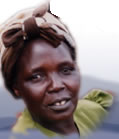THEMES IN THIS
TESTIMONY
Culture and Customs

Development

Education

Environment

Family Life

History

Identity

Land

Livestock

Politics

Social Change

Social Relationships

Click on arrows
to find more
testimonies
featuring
these themes
|
|
Sex
|
Male
|
|
|
Age
|
36
|
|
|
Identity
|
Sabaot
|
|
|
Occupation
|
Teacher
|
|
|
Location
|
Kibuk
|
|
|
Date
|
November 1996
|
|
summary
A spirited interview from a man who evidently feels passionately about his people and his culture, and who has spent time thinking about the tribal politics in Kenya and how this is related to the Sabaot’s present situation. This has resulted in an interview, which is quite inspiring at times, and littered with good quotes. However he is unafraid to comment on the shortcomings of his people as he sees them - their low self-esteem for instance, their conservative politics, and the attitude to women. His comments on the colonial era, though interesting, should be read bearing in mind that he was not born until 1961. The interview consists mainly of a discussion of the interrelated issues of politics, culture, development and education.
The fading of traditional values and customs, and the “flooding” of Sabaot society with “western culture”, is an issue that greatly bothers Moses. He believes that this is linked to the poor self-image the Sabaot have, which in turn is linked to a lack of development and education in the region due to tribal persecutions:“…there has almost been a stagnation of development…our destiny was in the hands of the Bukusu, who all along felt that the only way to dominate the Sabaot forever was to keep him sleeping, they did not want us to enjoy the benefit of formal education.” The narrator discusses tribal relations extensively, as they have played an important part in the politics, culture and development of Mount Elgon, and indeed Kenya: “Therefore, even when we are examining things like the recent land clashes between the Sabaot and Bukusu, it is rooted in that history.” According to the narrator, the history of conflict between the Sabaot and Bukusu has resulted in a poor deal for the Sabaot in relation to their culture, development, and education. But things are changing, particularly as a result of better education: “[education]…means better living, and the knowledge would help one overcome the many hurdles of life. We believe that we can bargain better for the national cake if we have good education. We have seen how education has helped other communities, and how they have taken advantage of the education they have, to prosper themselves.”
Moses’ account of the history, politics and culture of the Sabaot gives us an interesting insight and overview of the dynamics of the Mount Elgon region, and though he highlights the problems for Sabaot society, he ends on a positive note.
detailed breakdown
|
You will need a password from Panos to view the full
transcript of the interview. To apply for a password, click here.
Once you have a password, click here to go to the beginning
of the transcript. You can also click on any section of the
breakdown of content below and go straight to the
corresponding part of the transcript.
|
| Section 1 |
Growing up in a polygamous family - how his father tried to keep the peace within the family: “…my father made sure that though it was a polygamous family, we did not develop unnecessary friction based on houses - a common phenomenon in most polygamous families.”
|
| Section 1-2 |
Discusses the problem of the decline of tradition - gives example of the circumcision songs: “…the songs we used to have, informed, educated and told us about our roots.” Talks about “the flooding of our society with western culture…Anything new to the Sabaot represents civilisation as far as they are concerned.” Says that the Sabaot as a whole are suffering from an ingrained inferiority complex, which dates back to the colonial period, and has devastating effects.
|
| Section 2-3 |
“The elders should teach the youth how to be proud of their culture, and more specifically their language…We should examine all areas of our life.” The narrator feels optimistic for change
|
| Section 3 |
Says the Bukusu deliberately tried to keep the Sabaot underdeveloped and uneducated. “Therefore when we began to look at education positively, it was already too late, we did not have schools and therefore we struggled to put up some for ourselves. And still many of our people had not recognised the value of formal education… So because of that, nearly every aspect of development was tampered with in the region. You can see for yourself that we do not even have an inch of tarmacked roads here!”
|
| Section 4 |
History of conflict between the Sabaot and the Bukusu - during the colonial period, the Bukusu oppressed the Sabaot - wrongful imprisonment, stealing of land etc - because they had the support of the colonial administrators. “…this explains why the Sabaot were pushed out of the plains, to this strip of land along the mountain.”
|
| Section 5 |
Sabaot reluctance to open schools: “…we did not have any representatives in the ranks of those who were enlightened, to explain to our people the value of education.”
How things have improved since independence. Discussion of tribal politics in relation to the current political parties, and rights to land.
Importance of being given land in the forest, which gave the Sabaot a stable economic base.
How Sabaot had to change their names in order to gain access to education, and how this perpetuated the idea that Sabaot were inferior.
|
| Section 6 |
How, during the Moi era, many Sabaot who were given government positions during Kenyatta’s time were sacked, and others were evicted from their land in the forest - government claim that the forest had to be emptied for environmental conservation: “This was a reason our people did not take seriously because they had been in the forest for a very long time and we had not destroyed the environment.” How the Sabaot value the forest.
|
| Section 7 |
Describes the Sabaot as “conservative”, but many are starting to feel that the Moi government has neglected them: “…when it comes to the sharing of the national cake, nobody remembers us…Our location in a mountainous region can be an excuse to deny us development, but it can not convince anybody.”
|
| Section 8 |
Tribal politics and identity - how the Sabaot came to settle Mount Elgon.
|
| Section 8-9 |
Positive present day attitudes to education. That Sabaot parents will sell livestock to get school fees is seen as indicative of a radical change in attitudes - education enables them to empower themselves. Describes how the economic success of the first to receive education inspired others to do the same.
|
| Section 9 |
Gender and education: “I admit that our community has discriminated against women when it comes to education opportunities.” He himself would wish to treat his sons and daughters equally.
|
|


